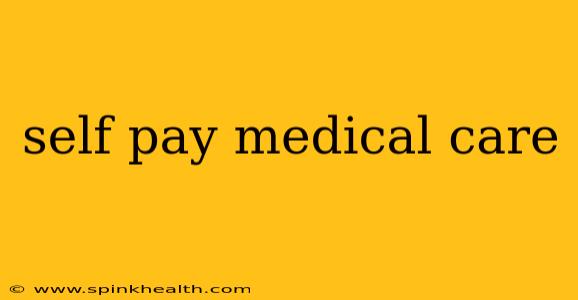The unexpected illness or injury can strike anyone, anytime. And while health insurance provides a crucial safety net for many, a significant portion of the population finds themselves navigating the complex landscape of self-pay medical care. This isn't always a choice; sometimes, it's a necessity driven by lack of insurance, high deductibles, or gaps in coverage. This guide aims to illuminate the path, offering insights and strategies for managing healthcare costs when you're paying out-of-pocket.
My name is Alex, and I've spent years researching healthcare finance and helping people understand their options. I've seen firsthand the challenges and anxieties associated with self-pay medical care, and I'm here to share my knowledge and empower you to take control of your healthcare finances.
What is Self-Pay Medical Care?
Self-pay medical care simply means paying for your medical expenses directly, without the involvement of an insurance company. This includes doctor visits, hospital stays, tests, procedures, and prescription medications. It can feel daunting, but with careful planning and research, it's entirely manageable.
How Can I Find Affordable Self-Pay Medical Care Options?
Finding affordable care when paying out-of-pocket requires a proactive approach. It's not simply about finding the cheapest option; it's about finding the best value for your money while ensuring quality care.
- Negotiate Prices: Believe it or not, many healthcare providers are willing to negotiate prices, especially for cash payments. Don't hesitate to ask about discounted rates or payment plans. Be polite, but firm.
- Shop Around: Just as you'd compare prices for any other significant purchase, compare prices among different healthcare providers in your area. Websites and online directories can help you compare costs for specific procedures.
- Consider Free or Low-Cost Clinics: Many communities offer free or low-cost clinics that provide essential healthcare services to individuals who are uninsured or underinsured. These clinics often have sliding-scale fees based on your income.
- Utilize Telemedicine: Telemedicine offers convenient and often more affordable access to healthcare professionals for routine checkups and consultations. It can significantly reduce travel and waiting room costs.
What are the Advantages and Disadvantages of Self-Pay Medical Care?
Advantages:
- Simplicity: You're in complete control of your healthcare decisions and payments. There's no navigating complex insurance networks or dealing with claims.
- Potential Cost Savings: In some cases, negotiating cash prices can result in lower overall costs than using insurance, particularly if you have a high deductible.
- Privacy: Your medical information isn't shared with an insurance company.
Disadvantages:
- High Upfront Costs: The most significant disadvantage is the potential for high out-of-pocket expenses.
- Financial Risk: Unexpected medical emergencies can lead to substantial debt if you're not prepared.
- Limited Access to Specialists: Self-pay patients may have limited access to specialized care or advanced treatments due to cost constraints.
What Payment Options are Available for Self-Pay Medical Care?
Most healthcare providers offer a range of payment options to accommodate self-pay patients:
- Cash: This is the most straightforward option, often resulting in the best discounts.
- Credit Cards: Many providers accept major credit cards, potentially allowing you to earn rewards points or utilize a payment plan.
- Financing Plans: Some providers offer in-house financing plans or work with third-party lenders to help patients manage their payments.
- Payment Plans: Negotiate a payment plan directly with the provider to break down the cost into manageable installments.
How Can I Budget for Self-Pay Medical Care?
Effective budgeting is essential for managing self-pay medical expenses.
- Emergency Fund: Building a dedicated emergency fund specifically for unexpected medical expenses is crucial. Aim to save enough to cover several months' worth of living expenses.
- Healthcare Savings Account (HSA): If eligible, contribute to a Health Savings Account (HSA). This tax-advantaged account can be used to pay for qualified medical expenses.
- Track Expenses: Meticulously track all medical expenses to gain a clearer picture of your spending and identify areas where you can save.
Are there any resources available to help with self-pay medical care costs?
Yes! Several organizations offer assistance to individuals struggling with healthcare costs:
- Local Charities and Nonprofits: Many local charities and nonprofits offer financial assistance for medical expenses.
- Patient Assistance Programs (PAPs): Pharmaceutical companies often offer patient assistance programs that help individuals afford prescription medications.
- Hospital Financial Assistance Programs: Hospitals frequently have financial assistance programs for patients who demonstrate financial need.
Navigating self-pay medical care can feel overwhelming, but by being informed, proactive, and resourceful, you can effectively manage your healthcare costs and access the care you need. Remember to always ask questions, compare prices, and explore all available resources. Your health is paramount, and taking control of your healthcare finances is a crucial step in prioritizing your well-being.

